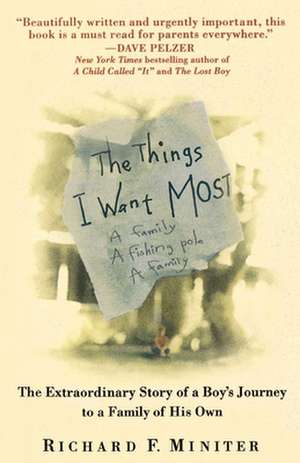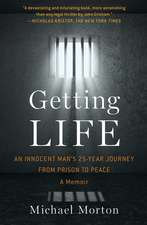The Things I Want Most: The Extraordinary Story of a Boy's Journey to a Family of His Own
Autor Richard F. Miniteren Limba Engleză Paperback – 31 ian 2000
It was a small note buried in the file of a deeply troubled eleven-year-old boy--a plea for a normal life Rich and Sue Miniter couldn't ignore:
The Things I Want MOST:
A family
A fishing pole
A familyThe Miniters heard in that simple note the voice of a frightened child who wanted what all children want and need: someone to love who would love them in return.
So they brought Mike home to the cozy country inn they'd restored and managed in rural upstate New York. There, over the next year, they would try to make Mike's dream come true. But first they would have to work through the fear, anger, and distrust that accompanied this boy who had lived his whole life with the label "severely emotionally disturbed." For the biggest obstacle to Mike's happiness was Mike himself, who gave the Miniters every reason to give up but one--the power of love.
When Richard and Sue Miniter decided to open their home--and their hearts--to a foster child, they couldn't imagine the frustrations and joys, the breakthroughs and setbacks, not to mention the emotional toll, that awaited them. Here is the remarkable true story of how their lives changed forever with their decision to answer an abandoned child's wish for THE THINGS I WANT MOST. -->
Preț: 113.22 lei
Nou
21.67€ • 23.55$ • 18.22£
Carte disponibilă
Livrare economică 31 martie-14 aprilie
Specificații
ISBN-10: 0553379763
Pagini: 288
Dimensiuni: 139 x 216 x 18 mm
Greutate: 0.38 kg
Editura: Bantam Books
Notă biografică
Extras
This is the true story of a remarkable and profoundly emotionally disturbed boy who descended upon our woefully unprepared family in late summer of 1993.
It is the story of his first year, of his progress, the changes he forced in the family and in himself, and to some considerable degree it is a story of animals, of legends and woodsmoke, and of a special program called Harbour.
The book is based upon numerous letters, documents, and a detailed, day-by-day diary I have of eight of those twelve months. At the request of the Dutchess County, New York, Department of Social Services, the name of the boy and the names of some other individuals have been changed. To provide a clearer illustration of the various lessons the family learned and to explain why we acted the way we did, I've occasionally altered the chronology and frequently indulged in mind reading, for which I apologize. None of the conversations in the book was ever recorded electronically and then transcribed. Many conversations were recorded word for word in my diary at the end of the day, but others were reconstructed in the following year based on diary entries and some questioning, but mostly on the memories of family members.
To other new parents of emotionally disturbed, difficult, or abused children, I can only say "God bless you," because despite being very experienced parents, we survived that first year in part, as my wife Sue says, "because after firing every arrow in our quiver, we threw rocks," but then as our "rocks" grew too heavy to shoulder, we were sustained with prayer, imagination, and by other family members, not the least of whom was the boy himself.
Chapter One: A Family, a Fishing Pole, a Family
"Why would they even show us something like this?"
It was the spring of 1993, and I was asking the question of my wife, Susan. We were alone in an office on the top floor of a house the Mental Health Association had converted to its headquarters. There, for the better part of the morning, we had been examining a file. And if the file was only half accurate, the child described in it was a monster. In fact, as I read on, one word kept tramping back and forth in my thoughts with heavy boots--sociopath, sociopath, sociopath. The person--the child--I was reading about was a sociopath.
At this time in my life I hadn't had any thought at all of helping anyone else, much less someone who needed this much effort. But we had been working up to this point ever since Sue had erupted with a sudden, bizarre interest in foster children a few months ago. It wasn't the first occasion in our married life when she had roared off after something. In fact, I often thought of her as a tiny door that opened on an immense furnace. But that extravagant force had usually been directed at some issue in the lives of our own five sons and one daughter or, as they grew, at the building of SCM Tax Prep, her tax preparation and financial planning business.
This, I had thought to myself many times at the start of those months, wasn't her. And it wasn't me, either. I had spent twenty-five years in manufacturing, beginning fresh from four and a half years in the Marine Corps as an expediter for a division of North American Phillips before winding up as a director of manufacturing for a medium-sized corporation in New Jersey. Then, determined to finish a novel I had begun while on a job in South Africa years before, I refused a reassignment, pocketed a check, and decided to see if I could make some sort of a living out of the abandoned and haunted old pile of a country inn in New York's mid-Hudson Valley that we were now calling home. And it all had just started coming together.
It wasn't as simple as I had first thought. But the place was getting finished on the inside, at least; we were renting bed-and-breakfast rooms on a long-term basis to some very quiet guests; I was working temporarily for a tiny, cobbled-together local manufacturer; and the book was finished. Meanwhile, I wasn't wearing a suit, I hadn't been on an airplane for business in a couple of years, and even though I had gained about twenty pounds, my blood pressure was down thirty points. I felt healthy, I still had all of my red hair--it was graying a bit in my mustache and on my temples, but it was still there--and every morning I'd get up with the dogs and climb the beautiful mountain we lived on. In milky, rainy dawns and violet sunrises I hiked every day for an hour through our overgrown hay meadow, past the beaver pond, up into the neighbor's manicured orchard blocks, then by the lakes and far up to where I could grin at the distant silvery stream of cars commuting south on the crowded New York State Thruway.
I had just finished helping myself, and life was good.
Our boys--even though they were large enough now that whenever they were home together, they reminded me of five young stallions, restless and cramped in a wee paddock--still required a lot of our time and energy. Our eldest son, Richard, was off and gone on a mad career as a writer and film producer, but others of them hadn't finished college. Henry was a senior and Frank a second-year man at Norwich, the Military College of Vermont, Brendan was just starting George Mason University in Virginia, and Liam was charting new boundaries in the typical male Miniter indifference toward high school. Our second child and only daughter, Susanne, had graduated from the State University of New York at Albany and was working, but this summer she was getting married and we were holding the reception at the house. It wasn't as if we didn't have things to do.
Yet whenever I raised any of these issues, Sue just paved over my objections with, "Rich, we're just looking into it and we're not making any decisions yet. I just want you to go along for a while. You can always say no later on."
"It's the empty-nest syndrome, isn't it, Sue? All the babies have grown and you miss them."
"No, I just have to take a look at this thing."
And so, confused and doubtful, not quite understanding what was driving her, I followed along.
What Sue hadn't told me--wouldn't tell me until long after our orderly, smug little life had been turned on its head--was that she had been struck much as Paul was smitten on the road to Damascus. She hadn't heard a voice or been knocked off a horse, but she had seen a picture--many pictures--and then been challenged in an extremely personal way.
During tax season Sue typically takes a short break around six or six-thirty in the evening in our inn's old barroom, where she perches on a stool, flicks on the news, and then eats a quick dinner, which I've laid out for her. It is a quiet, private time for her--twenty minutes or a half hour when she can be all by herself, get some nourishment, and recharge her batteries before going at it again for the next four or five hours.
It was in her second-story office that Sue made the leap from a job she commuted to in Manhattan and a part-time business into a flourishing full-time practice, and much as I do now, she revels in the thirty-second commute from our apartment with a second cup of coffee in her hand to the remodeled room where she toils happily with her cat dozing on the copy machine behind her. But the hours have stayed brutal--often eighteen hours a day during the months of January through April, as client after client comes calling.
I'm usually extremely careful to leave her entirely alone during her sole break of the day, but what I didn't understand this year was that other, darker presences were intruding.
Night after night in that early spring, the evening network news was full of pictures of starving children in Africa. Children dying in their mothers' arms, children being buried in shallow graves, children helplessly begging for something--anything--to eat. And meanwhile, there would be Sue, sitting all alone in the dim light, night after night, slicing into her juicy lamb chop and swallowing asparagus and mashed potatoes. Finally, one evening, utterly helpless and angry, she slammed down her knife and fork and jerked the TV directory over to her to find something other than news to watch. But when she riffled through the little booklet it fell open to an advertisement--a plea from an organization called The Harbour Program for experienced parents to provide a structured, nurturing home for abused and neglected children.
Sue had sat there stunned for a long moment, read and reread the advertisement, and then finally folded the page over and tore it out.
Yet later, at bedtime, she didn't explain any of this. All she did say was, "I saw an advertisement in the paper I want us to answer."
"What kind of advertisement?"
"There's a special kind of foster-care program that needs help. It's called Harbour."
"What? Why?"
Harbour is a small, new division of the Mental Health Association in Ulster County, which places difficult-to-manage, often emotionally disturbed children into local families which could, with an intensive system of training and support, provide a therapeutic setting for them. The idea is to introduce these children to a normal family routine and then, working with the biological parents, perhaps safely reunite them with their own families. When Sue called the phone number in the advertisement, the social worker who answered listened to a synopsis of our background and invited us up for a chat.
"No."
"Rich," Sue said, tapping her foot, "an hour of your time."
"No."
"Rich, I'm not going to come back here and try to repeat everything I've heard. I want your reading on this, too."
"No."
Sue gritted her teeth; the word she was trying to get out never came that easily for her. "Please."
"Rats."
The next day we went up to Kingston, had coffee with a nice lady named Debi, and were introduced around. Despite misgivings, I found I liked most of the people we met. I appreciate people with a clear vision or mission, and these people seemed to have one. And it wasn't sewn together out of odd parts, either. What was conveyed to us that day was lucid, simple, and understandable: they wanted to break the dreary loop of abuse, removal, return, and then more abuse, followed by more removals, that all too often seemed to prevail in the current child-care system. They would recruit experienced parents, place a single child with them long-term, and then follow up with a comprehensive system of support.
So, modeling itself on other "therapeutic foster care" programs elsewhere, Harbour was sorting out those children and families in the mid-Hudson region who would benefit most from an intensive system of support from seven-day-a-week, twenty-four-hour-a-day availability of staff, from family specialists with very small caseloads, weekly and intensive visits, a comprehensive system of reporting, a strong and daily emphasis on the positive reinforcement of both parents and children, and perhaps most of all, the example furnished to both parents and children by the long-term placement of the children with stable families. The example of, as The Harbour Program termed them, "professional parents."
Us.
Harbour wasn't a broad-based program. The families selected were few and very carefully chosen, as were the children involved. Harbour was determined that it too would provide a model for further programs and could do that only if it was successful in turning the lives of many of its children around.
In learning all of this, I couldn't avoid feeling complimented when, during that first informal visit, Debi seemed to consider us very impressive parents and suggested we consider joining. Of course there was still a universe of doubt on my part. This first brief introduction to Harbour seemed to confirm Sue's determination to help some new child somewhere, and the visit dampened much of the instinctive aversion I had to mucking about in somebody else's life and, of course, to unsettling my own. Yet I was still deeply suspicious of getting involved in something so very different from anything we had ever done before. Professional parent? Me?
But then I began a very private line of thought. A leafless little thing at first, it started to sprout and flower in my imagination as we made the quiet forty-five-minute drive home. "What if such a child was a girl?" I was sick of boys. In one dimension I thought I was tough. I had been a Marine Corps NCO, a chief of police, had made a living for a lot of years in a rugged field, but raising any one of my five sons was like mining gold in the midst of a rock slide. When it's all over there might be a nugget or two in your pouch, but you're a long way downhill, awfully bruised and broken up. I hadn't, I thought, the stamina for another go. But a girl? I remembered how marvelous my daughter Susanne was when she was growing up. Girls you can buy pretty little dresses for, they have nice friends, their room smells nice, they smell nice, and they always remember your birthday.
So I had a secret agenda operating when Sue suggested we "at least go through the training" and complete Harbour's multipage application. Then, after a preliminary acceptance, we were scheduled for training classes. We completed them in the evenings, met a "family specialist" we would be working with if we accepted a child, interviewed several other parents in the program, and had our background intensively investigated.
And now, several months later, we were inspecting a child's file. A child The Harbour Program thought we might consider a match.
The Harbour staff hadn't seemed to hold much back in training. The children selected for this special program had emotional, psychological, and/or physical problems. Typically they'd been exposed to family violence, drug use, prostitution; they'd been starved, kept out of school, left alone for long periods. Many of them had failed over and over in earlier placement attempts with standard foster-care programs.
Yet at the same time the Harbour people assured us that a panel of professionals had reviewed the children's case histories and determined they would and could benefit from therapeutic foster care. The general picture Harbour painted of these children was one of withdrawal and hurt--vulnerable, bruised, torn were the words used most often, and so Sue and I, particularly Sue, started the file with more than some empathy for this unknown child.
But all that changed very fast as we read. The children we had learned about in training now seemed abstract and theoretical, almost laughably passive. This thing we were getting a picture of was something very different.
It was all there in a very thick stack of densely typed reports: eight years of evaluations, family court orders, social service summaries. The boy was borderline retarded, unmanageably violent, and had to be continually medicated. I counted the number of foster families and institutions that had tried to do something with him, and it summed up to a nice round dozen. When he was young he had been severely neglected--not fed regularly, not bathed, not dressed. He was removed from his mother when he was fifteen months old, then returned at the age of three, whereupon he was beaten into a coma. Now, according to the psychiatric reports, the boy had an extremely low IQ, erratic small-motor coordination, and would not take any direction. He regularly assaulted the staff, wet his bed, and refused to climb out of it in the morning. When he did finally get to his feet, he couldn't walk very well and was suicidal.
It was horrible. This wasn't what Harbour had been talking about all these months. Was it? Besides, Harbour knew what we wanted in a child--they had certainly asked us enough times. We wanted, certainly Sue wanted, a child who could be gently coached into something like a normal life. And it certainly wasn't, I thought sadly, a girl.
"Sue, why would they even show us something like this?"
To my immense relief Sue seemed to throw up her hands, too. "Joanne said he was an attractive boy, and I know these kids need help, but there are limits--we can't deal with something like this. No. Not this--I don't want this." She sighed. "I might feel different if there was even one tiny shred of evidence to suggest this kid wants to be helped. But it's just not there."
I took off my glasses, rubbed my face, and stood up. The file was scattered around the room in odd piles. We had pulled it apart and divided sections of it up between us.
"Okay," I said, "let's put the stuff back."
Sue nodded and stood up to help.
"Rich, what's this?"
Sue was holding a single sheet of blue paper I hadn't seen. Apparently it had slipped out of the file when we took it apart and dropped to the floor. The paper was a sloppily photocopied form labeled across the top, "The Things I Want Most." There were three lines below it numbered one, two, and three. Over and around those lines was a child's sprawling, smudgy handwriting.
With a very uncomfortable feeling I remembered that in the entire file there had been nothing from the boy himself--no direct quotes, no transcripts, no letters--and I was grateful for the lack, glad that I hadn't that sort of connection with this child, even in a thirdhand way. So when I realized what Sue was holding, I said quickly, "Forget about it, put it back. You don't want to read that."
Sue almost did slip it back into the stacks of reports, but then shook her head.
Instead she walked over to the desk lamp and, after a moment or two of hesitation, I joined her.
Sue got it first, with the look of dismay caught in amber pushing aside the piqued curiosity on her face, and then she slowly, raggedly caught her breath. But it was more difficult for me to puzzle out. I had to trace my fingertips again and again over the ragged pencil marks before I realized it said:
The Things I Want Most
1. A Family
2. A Fishing Pole
3. A Family
Just then Joanne Dalbo, the family specialist assigned to work with us, opened the door balancing two cups of coffee in one hand.
"Hey, how did you guys make out?"
Then she saw the strained look on our faces and asked, "What's wrong? Are you okay?"
Sue just turned away and walked over to the window with her arms crossed over her chest.
When Joanne raised her eyebrows in question, I looked back over at Sue. I could tell from the set of her shoulders that she was making up her mind, and a single word popped out of my mouth.
Curiously, I then recalled an odd fact. Whenever a black box is retrieved from the scene of an airplane wreck, the last bit of speech recorded by the pilot before he hits the ground is often that very same word.
Joanne put the coffee down on the desk and then placed her hands on her hips. Attractive, slim, with dark hair and eyes, she was a bright, soft-spoken family specialist working for Harbour while she studied in her spare time for an advanced degree in English literature, and she had a profound interest in careful and precise speech. Now she seemed puzzled and a little bit hurt. "Shit," she repeated. "What does shit mean?"
It took us weeks to get to meet Mike. It was Joanne's job to schedule an initial meeting, but she was put off by the Catholic Children's Home, where he was living.
Programs like Harbour have to struggle with all the complexities of child-care placement, including the issue of access to children in a complicated, multilayered system that involves many organizations with variable, often arbitrary, and constantly changing rules and procedures. The Catholic Children's Home was no exception. And, of course, it's difficult to have a good working relationship with an agency or institution you have never encountered before.
In Mike's case, he had been referred to Harbour by the very children's home that had him now, but two issues, one very human and one quite frightening, were complicating access. The first was that, despite having referred many children to Harbour, the children's home was now somewhat doubtful of the program because Harbour had accepted none of them. But the other was the fact that in the time that had elapsed between their referral and Harbour's contact, Mike had tried to hang himself.
The act was labeled as "not a serious suicide attempt," I suppose because he didn't succeed, but the home had decided it was better to hold Harbour at arm's length while he "restabilized."
Meanwhile, we learned some additional facts. We learned that unlike most children in The Harbour Program, integration back into his biological family wasn't an option. He had been freed for adoption, and family court was determined there be no further parental contact.
We also found out that he did have a visiting "resource." It seems an older brother and sister were adopted by a local family three years earlier and that this family had taken Mike into their home as well. Unfortunately, the results were fairly horrific--uncontrollable tantrums, violent behavior, sleeplessness--and eventually he was removed for psychiatric evaluation to Rockland State Hospital. Following that admittance he was placed in the Catholic Children's Home in Rhinebeck and the family's application for adoption denied. But they still visited him from time to time, taking him for weekends and some holidays.
This last point only seemed to stiffen Sue's now-iron resolve to meet the author of that pathetic note. In her mind's eye, or perhaps her mother's heart, she could picture the despair of this child as he watched his brother and sister get on with their lives while he was routinely rejected in the most profound way.
"How can they pick him up and then just cart him back? How many times has he stood there in the parking lot of the children's home and waved good-bye to his brother and sister?"
In the days that followed, Sue developed a long list of other sad images. I'd see them emerge at mealtimes, while driving in the car, or when visiting friends. In the middle of talking about something completely different she'd suddenly declare, "Mike isn't sleeping, I just know it." "They haven't told him anything about us yet, and he's just as upset and hopeless as he ever was." "He isn't eating. What kind of food do they have there, anyway?" "Who's talking to the doctor about his medication?"
"Sue," I'd protest, "we haven't even met this child, and anyway, the children's home is top drawer, everybody says that. They're not neglecting him. Calm down. Things will sort themselves out."
But one night she woke me up out of a deep sleep. "For God's sake," she said, "I don't think anybody reads to him."
Groggy and confused, I said, "Reads to who, Sue? I don't know what you're talking about."
"Mike," she said back. "I know nobody is reading to him."
The next day at work I telephoned Joanne. "Look," I said, "I think we have a problem here. Every day that passes without a meeting has Sue worrying more and more about that boy. You've got to goose these people along. Can't you even get us in there to see him for a few minutes so that she can get this out of her system?"
Joanne sighed. "I know," she said. "Sue's been calling me continuously, and I've been calling them, but the home keeps putting me off."
"Well," I said, "they're the legal guardians. They can do what they want, I guess, but do what you can, would you? By this time next week Sue's going to be up there in the middle of the night dragging a ladder from window to window."
A few minutes later the phone rang back.
"Rich," said Joanne, "I just connected with something you said."
"What?"
"Guardianship. The home is not really the legal guardian; the Dutchess County Department of Social Services is. In fact there's a caseworker assigned, a woman named Gerri. I've spoken to her before. Maybe I should call her now."
Then she paused before adding, "Rich, I'm worried about Sue. We know that you, and especially Sue, can be great advocates for a child; that's half the reason we want you guys in the program. But Sue is beginning to seem like an emotional type of person who can quickly blow very hot, and so I've got to repeat what I know everybody in Harbour has told you: this is a long-term program and it's best that your emotional dial get set to zero. Some of these kids, and Mike is certainly an extreme example of this, have been in and out of so many placements that they're desensitized. Mike might go through the motions, but it will be a long time, if ever, before he could return the same sort of concern Sue is capable of--a long time before he can bond to you guys. Should you decide to take Mike, you're going to have to face the fact that you're not going to get much of anything back for a great while."
Sage advice. She knew what could happen. But I dismissed it because after twenty-seven years of marriage I knew that there wasn't much chance of changing Sue, and I was convinced Mike wouldn't end up with us. The file was just far too daunting, and I believed that Sue was ignoring all of that while constructing a model of this child in her mind that would be dashed to pieces when they actually met--that when she saw with her own eyes what he actually was, she had to understand that we couldn't have something like that in the house. Our guests would leave, and we depended on that income. Her business wouldn't allow that sort of investment of time, nor would our obligations to our own children.
"Hey," I cracked, "virtue is its own reward." I felt guilty, deceptive, in wanting to avoid this child.
Joanne laughed gently, and I could picture her shaking her head. "Okay, you guys. Here we go."
Recenzii
--Dave Pelzer
"An amazing book, warm and inspiring. You finish it not warned off by the Miniters' experience, but wanting to emulate it."
--The Washington Post
"Candid and remarkably hopeful."
--Kirkus Reviews
"A primer for anyone who might want to be a foster parent, especially for a special-needs kid. It does not pull any punches but does pull on your heartstrings."
--Albuquerque Journal
"If just one family reads this book and decides they would be willing to try with a child like Mike, it could literally save a child's life. This is an incredible story of amazing people."
--Marian Wright Edelman, President, The Children's Defense Fund
"Here is an unpretentious and unsentimental, wonderfully engaging account of American idealism as it was lived out, day by day, in a particular family--a story of what is possible when an aroused parental loving-kindness takes on a child's legacy of disorder and early sorrow."
--Dr. Robert Coles, Harvard Health Services, author of The Spiritual Life of Children
"An amazing book, warm and inspiring. You finish it not warned off by the Miniters' experience, but want-ing to emulate it."--The Washington Post -->
Textul de pe ultima copertă
The Things I Want Most
It was a small note buried in the file of a deeply troubled eleven-year-old boy -- a plea for a normal life Rich and Sue Miniter couldn't ignore:
The Miniters heard in that simple note the voice of a frightened child who wanted what all children want and need: someone to love who would love them in return. So they brought Mike home to the cozy country inn they'd restored and managed in rural upstate New York. There, over the next year, they would try to make Mike's dream come true. But first they would have to work through the fear, anger, and distrust that accompanied this boy who had lived his whole life with the label "severely emotionally disturbed". For the biggest obstacle to Mike's happiness was Mike himself, who gave the Miniters every reason to give up but one -- the power of love.









